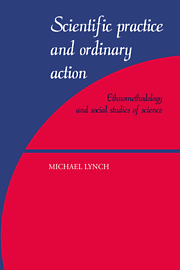Book contents
- Frontmatter
- Contents
- Acknowledgments
- Introduction
- 1 Ethnomethodology
- 2 The demise of the “old” sociology of science
- 3 The rise of the new sociology of scientific knowledge
- 4 Phenomenology and protoethnomethodology
- 5 Wittgenstein, rules, and epistemology's topics
- 6 Molecular sociology
- 7 From quiddity to haecceity: ethnomethodological studies of work
- Conclusion
- Name index
- Subject index
1 - Ethnomethodology
Published online by Cambridge University Press: 03 December 2009
- Frontmatter
- Contents
- Acknowledgments
- Introduction
- 1 Ethnomethodology
- 2 The demise of the “old” sociology of science
- 3 The rise of the new sociology of scientific knowledge
- 4 Phenomenology and protoethnomethodology
- 5 Wittgenstein, rules, and epistemology's topics
- 6 Molecular sociology
- 7 From quiddity to haecceity: ethnomethodological studies of work
- Conclusion
- Name index
- Subject index
Summary
Ethnomethodology can be described briefly as a way to investigate the genealogical relationship between social practices and accounts of those practices. It generally is considered to be a subfield of sociology, although it also is represented in communication studies, science studies, anthropology, and philosophy of the social sciences. Its connection to twentieth century traditions in social theory and sociological methodology is both deep and ambivalent. It is deep because ethnomethodology offers a way to address a set of themes that have unquestioned pride of place in theories of social structure and social action. They include action, order, rationality, meaning, and structure, among others. These themes are also prominent in methodological debates about the relationship between commonsense reasoning and scientific analysis. The connection is ambivalent because ethnomethodology's orientation to these foundational topics puts it at odds with most of the established theories and methodologies in the social sciences.
Ethnomethodology's relationship to sociology is difficult to describe and comprehend. Many ethnomethodologists work in sociology departments, so in that sense they are sociologists, but one of their most infuriating research policies has been to place “professional” sociological methods for generating knowledge of social structure alongside the “lay” know-how that is substantively part of the society that sociologists study. As a matter of research policy (if not personal conduct), ethnomethodologists treat the “family concerns” of professional sociology with studious indifference. By treating lay and professional methods as part of the same domain of study, they distance themselves from the disciplinary form of life in which they and their sociologist colleagues conduct their professional affairs.
- Type
- Chapter
- Information
- Scientific Practice and Ordinary ActionEthnomethodology and Social Studies of Science, pp. 1 - 38Publisher: Cambridge University PressPrint publication year: 1994

